There’s a national and state emergency. You’re stuck at home. Maybe you have kids who need activities to keep them busy. Why not try the library? You can’t go to the library physically, but the Stevens Memorial Library in North Andover offers enough reading and other activities to carry you and your family through the coronavirus crisis and beyond.
Author: June Thammasnong
-
Worcester Public Library launches #HeartWorcester campaign to unite community
When the Worcester Public Library found out it would be closing in order to help prevent the spread of the coronavirus, employees began thinking of a way to connect community members without physically gathering together. The #HeartWorcester campaign was then born.
-
Remarks from MBLC Board Chair Roland Ochsenbein
Remarks given as the Board Chair Report at the April Meeting of the Massachusetts Board of Library Commissioners
Twenty-eight days ago, on March 5, we held our monthly MBLC board meeting at the Boston Public Library. BPL President David Leonard welcomed us and we conducted our business that day in the usual fashion, together in the Commonwealth Salon. Afterward, we toured the digitization labs. It was a normal, bustling day at the BPL.
The next morning, I spoke at a legislative breakfast hosted by the Bigelow Free Public Library in Clinton, one of the last of the breakfasts leading into the FY 2021 legislative budget season. The breakfast was well attended, the mood upbeat and enthusiastic. Representative Natalie Higgins, the House Library Caucus Co-Chair, also spoke, as did Senator Harriett Chandler and Representative Harold Naughton, all of them articulate library supporters. Coming off a year in which our total funding exceeded our request (for possibly the first time ever!), there was by contrast a hint of caution in their comments regarding next year. Important needs in education, transportation infrastructure, and other areas would compete for any increases the state would see in its revenue collections. Mind you, this was before the spread of the corona virus was fully understood. Libraries will be okay they assured us, but just know that there is some pressure next year. As of a few weeks ago, that was where we were going into next year.
Since then, and with stunning speed, the world has completely changed.
Beginning on March 13, Governor Baker began issuing increasingly severe emergency orders in response to growing concerns over the spread of the corona virus. On that day, he issued an order prohibiting large gatherings. Two days later, he ordered public schools closed, prohibited gatherings of 25 or more, and prohibited on premises consumption of food and drink at bars and restaurants. Four days after that, he activated the National Guard. In another four days, on March 23, he ordered non -essential businesses to cease in-person operations, and he issued a statewide stay-at-home advisory. And just two days ago, he announced that the DCU Center in Worcester is being stood up as a field hospital, and that an arena at Fitchburg State is being outfitted as a temporary morgue if needed…an arena to serve as a temporary morgue.
As we meet today, remotely via Zoom video conference, it is a very different world compared to that of last month’s board meeting in the marvelous surrounds of the Boston Public Library. Today, all public library buildings in the Commonwealth are closed to the public, as are nearly all academic and special libraries. That is an extraordinary statement. The only other time this has occurred was not during the Great Depression or a World War, it was during the influenza pandemic of 1918, when an estimated 675,000 people in the U.S. and tens of millions worldwide succumbed to the disease.
I am extraordinarily impressed with the response of the MBLC leadership and staff and those of our affiliates during this difficult time. The number of communications that have come out this past week or so as things have developed so rapidly– updates, advisories and announcements, including the comprehensive MBLC Service Update from yesterday– are excellent and so needed at this time. I was also pleased to see articles from publications such as the Boston Globe and the Atlantic describing how the availability of library services, many of them digital, are playing an even more important role at a time when buildings are physically closed—eBooks, audiobooks, databases, online courses, virtual story times, outside-the-building WiFi access, phone assistance and outreach, and more. The MBLC, the affiliates, and others have been working to expand the already wide access to electronic offerings. At a time when most are staying home and schools are closed, these services are enormously beneficial, possibly even life saving. I’ve seen any number of communications from libraries around the state, on social media and elsewhere, offering service updates that are resourceful, creative, and uplifting even in this heavy time. Libraries at their best. I am proud to be associated with this community.
We will eventually recover. I personally think it will take a long time to fully recover. There are many long-term consequences that are not yet understood. That said, public libraries and the role they play in society will be, I am certain, critically important to recovery efforts in too many ways to list here. And I think this may well be the focus of our message over the coming months, as we, at the appropriate time, turn our attention to regaining full operations.
The budget fallout may also be significant. The FY 2021 state revenue forecasts will certainly be revised as a result of the economic disruption we are experiencing, and that in turn will inform a new look at FY2021 and beyond. We will need to communicate our needs and our value often and clearly to lawmakers. Further, it is unclear what impacts, if any, there may be on the construction program in terms of passing the bond bill, raising the cap, and whether or to what extent projects may be delayed or reconsidered at the local level. I think there is also concern building on the municipal level about next year’s local budget picture. Local tax receipts will be directly affected by the temporary closure of businesses, loss of sales/meals/room taxes, and the compounding effects of job losses. But then there may also be some positive countervailing consequences from the various stimulus measures.
Looking ahead, there are at this moment more questions than answers but what IS clear is that the future looks very different today than it did just a few weeks ago, and our role in supporting libraries and helping make things better for people may never be more important than it will be over the coming months and possibly years.
Finally, I’d just like to say that, according to health officials, it seems clear we are in for a very difficult few weeks or months immediately ahead. I pray for all of our good health.
-
MBLC Service Update 4-1-2020

MBLC Service Update
April 1, 2020
As we work together to get through the current reality, the MBLC will provide regular updates on MBLC services and other statewide issues. Please let us know if there’s info you’d like us to cover—we’ll include it if we are able. Stay well.
State Budget
Director Lonergan has been in touch with leaders of the Library Legislative Caucus. The Governor released his budget recommendation in January. However, it is uncertain whether the House and the Senate will be able to adhere to the normal budget schedule. House Ways and Means typically releases their budget in April and Senate Ways and Means releases theirs in May. The next fiscal year begins on July 1, 2020.The legislature remains active and have passed or are considering several bills addressing the current crisis. Passed bills include moving the tax filing deadline to July 15 and allowing municipalities to delay municipal elections.
Federal Budget
The Institute of Museum and Library Services (IMLS) announced that the President has signed the CARES Act, which designates $50 million in coronavirus response funding for IMLS. Following passage in the House of Representatives, both chambers of Congress approved of the Coronavirus Aid, Relief, and Economic Security (CARES) Act, a $2 trillion response to the growing pandemic. The IMLS press release has more information. The MBLC anticipates further guidance on how much funding Massachusetts will receive and how these funds may be used.
MBLC Monthly Board Meetings
Contact: Rachel Masse
The MBLC held an emergency board meeting, via conference call, on March 19, 2020. The Board is holding its April 2, 2020 meeting via Zoom and will continue to address board business in this way until in-person meetings are again possible. Board meetings are the first Thursday of every month.Construction-The Massachusetts Public Library Construction Program (MPLCP)
Contact: Lauren Stara
Andrea Bunker- There has been no further movement on the bond bill, H4154; now H4039, that contains funding for the Massachusetts Public Library Construction (MPLCP) program.
- The requirement for monthly reporting is suspended. MBLC staff will keep you posted as to when reporting will resume and what will be required.
- For active construction sites
Governor Baker’s new guidance for all public construction projects statewide requires adherence to the “safety stand down” guidelines provided to the construction industry last week. This temporary order requires a halt to public construction projects (effective 3/27/2020), and applies to all projects managed or sponsored by the state or a state agency, including the library construction projects funded through the Massachusetts Public Library Construction Program (MPLCP), while contractors review site-specific issues, develop mitigation strategies and communicate to workers about new state guidelines for construction work during the coronavirus pandemic.
Those new state rules require, among other things, all workers to self-certify before each shift that they are not sick and that certain construction workers have their temperatures taken daily. Also last week, the Governor’s chief legal counsel sent a letter (https://www.mass.gov/doc/march-25-2020-construction-guidance/download) to city and town executives with the new guidance and instructions that all construction projects should continue operations during the Governor’s state of emergency but with social distancing measures incorporated. The guidance imposes a zero tolerance policy at work sites. If a worker is sick, they are to remain home. If a worker begins to feel sick on the job, they are to go home. And if a supervisor sees a worker who appears sick, they are to send the worker home.
Please keep us updated as you are implementing the guidelines required in the Governor’s directives and let us know of difficulties or challenges you face in the implementation of those guidelines.
Contracts/Business Office
Contact: Tracey Dimant
The MBLC business office sent out the second State Aid payments last week and continues to process contracts, funding requests from affiliates, and invoices from vendors, as well as handling daily operations.LSTA (Federal funding from the Institute of Museum and Library Services)
Contact: Lyndsay Forbes
Shelley Quezada
Rob Favini
Official statement regarding the current direct grant round- The LSTA team is working with libraries as they get ready to submit proposals that are due April 7 , 2020
- LSTA staff are working with libraries finishing their current grants to rework their schedules due to COVID-19 disruptions.
- There is a new LSTA-funded opportunity: Scholarships to attend the ARSL small libraries conference in November. Learn more
- Shelley has been working with the Commission for the Deaf and Hard of Hearing and sent a announcement out on all regions, pubdir etc to request help in getting out information about serving this community—librarians were very responsive (no surprise, there!).
- Shelley is also been trying to keep up with what’s happening in prisons. Prison librarians are not going into the jails as it is a safety issue for them.
Networks
Contact: Paul Kissman
Kate Butler
MBLC convened a meeting with automated resource sharing network administrators and MLS last week to share current practices and planning around the pandemic. Networks discussed eBook and audio content handling and purchasing, requesting and borrowing parameters, such as changes in overdues, patron notifications, amnesty periods, and how patron-placed holds are affected. In particular networks discussed possible plans for managing the backlog of materials when libraries begin to reopen to the public and the statewide delivery system comes back online.Preservation and Disaster Recovery
Contact: Evan Knight
MBLC Preservation Specialist Evan Knight, in collaboration with COSTEP MA board members and subscribers (“Coordinated Statewide Emergency Preparedness in Massachusetts”), has developed guidelines for response from the perspective of collections preservation. The page, “Public Health Emergencies: COVID-19,” was published March 13, and recently updated March 26 to reflect the dynamic situation. Two national organizations have recently cited the page for wider distribution: the Association for Library Collections and Technical Services, a division of the American Library Association, at “Handling Library Materials and Collections During a Pandemic,” and the American Institute for Conservation, at “Collections Care Amid COVID-19.” Thanks to Evan on this resource, which will be continuously updated, and please feel free to reach out to him with questions and concerns regarding your collections.
Evan also shares this valuable webinar from IMLS and the CDC: Mitigating COVID-19 When Managing Paper-Based, Circulating, and Other Types of Collections.
The webinar recording can be accessed here.If you have follow-up questions for the CDC, you may submit them to imlsinfo@imls.gov.
The materials and links mentioned in the webinar have been added to the IMLS coronavirus page under “Official Government Information and Resources.”
Promotion
Contact: Celeste Bruno
Matthew Perry
Staff are using MBLC social media channels to connect users and librarians to digital resources.
The team has also created promotional posts for libraries to use on their social media channels:
Digital Library social media posts
New databases social media posts
Database promotion
The MBLC has developed database promotion for social media that takes users directly into the databases and gives the local library the usage statistic:
Databases Dogs
Databases Wellness
Databases Kids
Databases: Home Improvement
Databases Healthy AgingState Aid To Public Libraries
Contact: Liz. Babbit
Uechi Ng
Mary Rose Quinn- In light of the current global situation, the Board will be reviewing the State Aid policies for FY2020 on April 2. Updates will be sent to libraries, trustees, networks, etc. following the meeting.
- Second State Aid payments for FY2020 went out and Library directors will soon be getting an email with a breakdown of the total amount into LIG, MEG, and NRC amounts.
- Liz Babbitt continues to update the Public Library Closures Google Docs for both libraries and the public.
Links to the documents:
For Patrons
https://docs.google.com/spreadsheets/d/1FeAKwGWmgQqrxwFSV12bko3lgrqwp3XACbRwctFeC6w/edit?usp=sharing
For Librarians
https://docs.google.com/spreadsheets/d/1jxcw4bwx3Z0ma0MR478qIE1WfBNoIcQczKogg3JyPpI/edit?usp=sharing
Changes and updates can be submitted through our LibWizard form: https://mblc.libwizard.com/f/covid-19
Statewide digital library – libraries.state.ma.us
Contact: Kate Butler (website issues)
Matt Perry (content additions)
MBLC staff have been working to increase ease of access to digital resources. The consumer portal libraries.state.ma.us has been updated and expanded to include free-for-now resources as well as unique opportunities from authors, illustrators and educators. The resources can be seen at https://libraries.state.ma.us/pages/free-resources Always free statewide resources are also included. This one-stop place makes it easy for residents to find library resources and other free resources.Summer/Bruins
Contact: Celeste Bruno
Rachel Masse
Matt Perry (materials and orders)
Staff has been in touch with our partners at the Boston Bruins. Many Bruins staff have been furloughed, including the staffer who works with us on the summer program. Right now , it is unclear whether Blades visits will occur this summer. Bruins summer materials have all been developed but the MBLC is holding off on orders for now. MBLC staff is working to confirm if the new for 2020 First Lady and Blades Summer Reading Challenge can still move forward. Staff has taken orders for the national CSLP poster but getting them out to the libraries is an issue due to closures.Trustees and Friends
Contact: Maura Deedy
Rob Favini
Our Spring schedule of Trustee Orientations is currently paused in compliance with Governor Baker’s social distancing protocols. We will resume trustee orientations as soon as we can.
But in the meantime remember that Maura and Rob are available to answer any questions that you have regarding new trustee onboarding, best practices, or the latest MBLC information regarding library services during the COVID-19 pandemic.2020 Census
Contact: Maura Deedy
Maura’s reminder: being home is the perfect time to take the census online or by telephone.New resources that can help you get the word out: https://2020census.gov/en/how-to-help.html?utm_campaign=20200330msc20s1ccallrs&utm_medium=email&utm_source=govdelivery
MBLC LibGuide: https://guides.mblc.state.ma.us/census
-
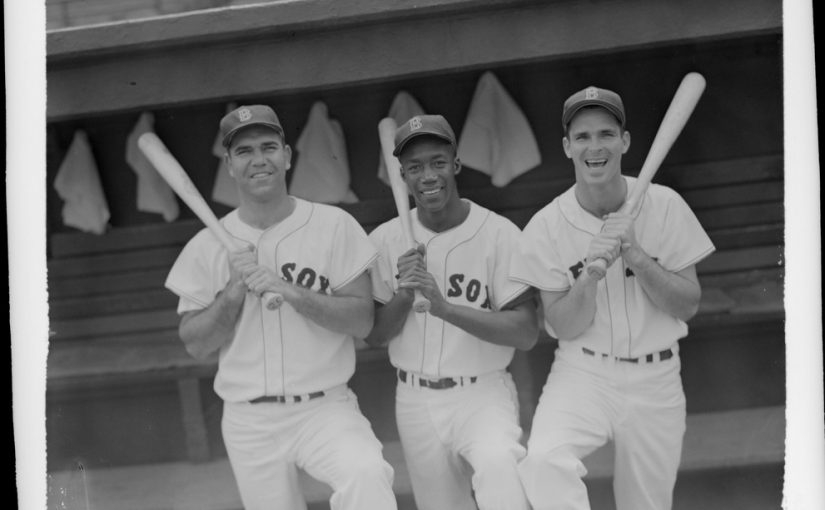
Baseball Season Starts Now with your Library
Major League Baseball was set to open its season today, but it has been delayed as a result of the Covid-19 crisis. Even though the players won’t be taking the field, you can still get your baseball fix today through your Massachusetts library!
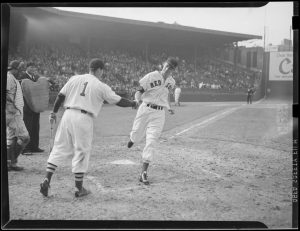
The Digital Commonwealth has an extensive collection of historic baseball photos taken by legendary Boston photographer Leslie Jones. Jones took photographs of the Red Sox and the Boston Braves throughout the mid twentieth-century, and captured many visiting players as well including Jackie Robinson. There is also baseball artwork, photos of the UMass Amherst baseball team, and other historic photos of the game being played in and around New England.
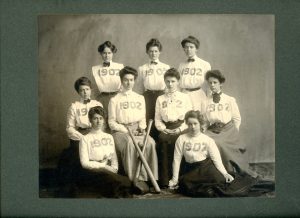 Baseball is not only a game, it is the inspiration for numerous books, available at your fingertips through the Massachusetts eBook program LEA. New titles include Evie Drake Starts Over by Linda Holmes, a love story about “a woman who has lost her husband and a major league pitcher who’s lost his game,” The Resisters by Gish Jen, a story about a dystopian future where society is divided and baseball allows one young girl to cross that divide, and The Cactus League by Emily Nemens which “unravels the tightly connected web of people behind a seemingly linear game.” Classic baseball books available through LEA include Wait Till Next Year by Doris Kearns Goodwin, The Natural by Bernard Malamud, and Ball Four by Jim Bouton. Get started with LEA today by borrowing a book about baseball.
Baseball is not only a game, it is the inspiration for numerous books, available at your fingertips through the Massachusetts eBook program LEA. New titles include Evie Drake Starts Over by Linda Holmes, a love story about “a woman who has lost her husband and a major league pitcher who’s lost his game,” The Resisters by Gish Jen, a story about a dystopian future where society is divided and baseball allows one young girl to cross that divide, and The Cactus League by Emily Nemens which “unravels the tightly connected web of people behind a seemingly linear game.” Classic baseball books available through LEA include Wait Till Next Year by Doris Kearns Goodwin, The Natural by Bernard Malamud, and Ball Four by Jim Bouton. Get started with LEA today by borrowing a book about baseball.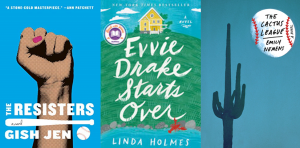
Filmmaker Ken Burns has allowed PBS to stream his renowned nine part documentary “Baseball” for free on its website. The documentary starts at the very origins of the game in the nineteenth-century and follows it up to the present day highlighting the unique aspects of the game and the personalities that have made it the nation’s pastime. The documentary is streaming for a limited time on the PBS website.
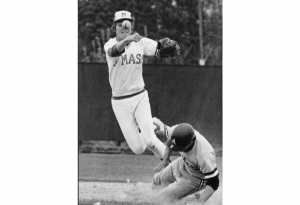 Even though the umps won’t be yelling “play ball!” today, we can at least indulge in some photographs, books, and movies to hold us over until the baseball season officially begins.
Even though the umps won’t be yelling “play ball!” today, we can at least indulge in some photographs, books, and movies to hold us over until the baseball season officially begins. -
Covid-19’s Impact on Libraries Goes Beyond Books
For Jennifer Pearson, the choice was difficult but clear: Shut down the library, or people could die.
“My library was filled with older people,” Pearson says. “I just wanted to go out and scream, ‘Go home. What are you doing here?’ I knew that if we didn’t make that move to close the building, they would never stop coming. We were, at that point, doing more harm than good.”
-
Take virtual tours of Boston-area cultural institutions from home
Residents of the Boston area are spending a lot more time at home due to the novel coronavirus pandemic that has led to not only limits on how many people can gather at one time and where but to the closure of myriad cultural institutions
But many of these same institutions—museums, parks, performing arts centers, libraries, and more—offer virtual peeks into their exhibits, collections, and other offerings. Some even have snazzy videos that really take your inside. And all of this from the (relative) comfort of your own home.
-
Kid Lit Authors Step Up To Help Educators, Students, and Parents
As educators, parents, and students enter this unknown territory of school closures and remote learning, kid lit authors and illustrators have been stepping up to help. Many are parents themselves and juggling the same school/work balance amid the stress and uncertainty.
“Gina and I are transitioning to homeschooling,” tweeted Jarrett J. Krosoczka, creator of the graphic novel Hey Kiddo among other titles. “We need to keep the kids on a schedule, and we are imagining we are far from alone. We want to help. Every weekday at 2pm ET for at least the next few weeks, I’ll host free webcasts for you and your kiddos. http://youtube.com/studiojjk ”
-
Self-quarantined and looking for something to do? Take the census, state says
Hundreds are self-quarantining in Massachusetts. Colleges are sending students home. Social interaction is edging toward taboo.
That’s not the ideal environment to conduct a nationwide head count. So with the launch of the 2020 Census on Thursday, Secretary of State William F. Galvin made a plea to Massachusetts’s estimated 6.9 million residents to not only ensure they’re counted, but to do it online.
“I now see this is as a lifeline, as it were, given the circumstances we’re now under,” Galvin said Thursday of the option to respond to the 2020 Census electronically, though the old-fashioned avenues — by phone, by mail, or to a census taker face-to-face — all remain.
-
2020 Census: Now is the time to get involved!
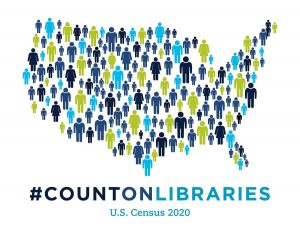
By Maura Deedy, Library Advisory Specialist at the MBLC
Last month, I hosted three 2020 Census 101 sessions around the Commonwealth. These sessions brought together librarians and other community partners together to receive information about the 2020 Census, and think about how to share it with their community.
On Monday February 24, 2020 I spent the morning with 19 librarians from Western Mass at the Massachusetts Library System Northampton office. We kicked off the meeting with introductions and sharing. In that spirit, here are some of the wonderful ideas Massachusetts libraries are doing to support a complete count in our communities:
Greenfield Public Library will have one dedicated laptop for self-response with trained staff available at all times to answer census questions. They’ll host pop up events in the community at the senior center and Stone Soup Cafe.
Many libraries will have a designated computer, like Palmer Public Library and Paige Memorial Library (Hardwick). Libraries may consider removing authentication or modifying time limits to support census self-response and putting a short cut on each workstation.
A few libraries discussed their partnerships with the local senior center or council on aging. Heath Free Public Library and Dickinson Memorial Library (Northfield) are planning on outreach events at local senior centers. They will bring laptops and devices to help with self-response.
Tyler Memorial Library (Charlemont and Hawley) shared that they successfully advocated for additional funding to expand hours to encourage local residents to complete their census at the library using library tech or with their own devices. The disparities in access to broadband internet are more acute in Western Mass, where libraries or municipal buildings are the only places with Wi-Fi available.
Westfield Athenaeum is training their staff on how to answer basic census questions, and put a direct link to the census website on the desktop. They are working on a census focused story time for children with counting activities.
For many of the smaller libraries in Western Mass that may not have the staff to run programs, making passive displays is an excellent solution. Tilton Library (Deerfield) will have displays with information, handouts and an FAQ.
One of the activities in the training was a design thinking workshop about who our hard to count communities are and planning an activity to reach them. Look for that on our 2020 Census guide.
2020 Census Resources:
Census 2020 in Massachusetts: https://guides.mblc.state.ma.us/censusAmerican Library Association: http://www.ala.org/advocacy/govinfo/census
Secretary of the Commonwealth: https://www.sec.state.ma.us/census2020/index.html